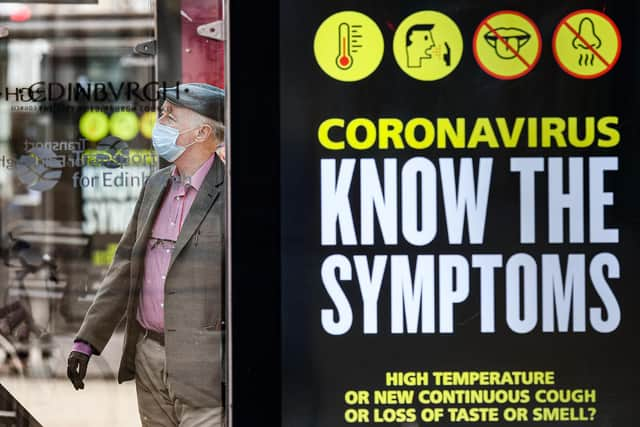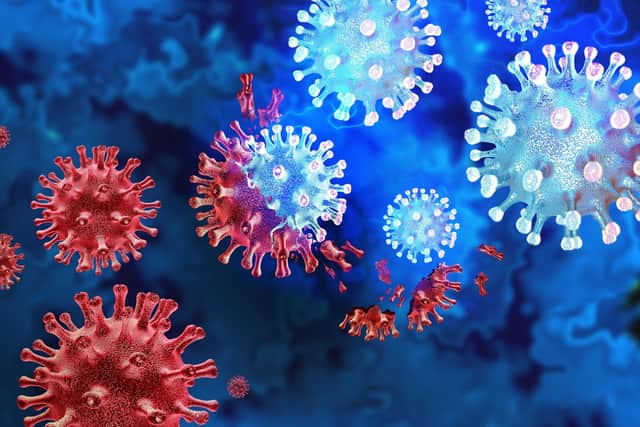Omicron Scotland: Could this new variant spell the end of the pandemic?
In Scotland every adult is to be offered a booster vaccine before the end of January, lateral flow tests will be made available at supermarkets and shopping centres, and Nicola Sturgeon has pushed the UK Government for tighter curbs on international travel.
The nature of Omicron has so far kept the scientific community guessing - and worrying, as early data suggests it could be more transmissible than previous strains, and its mutations have sparked fears vaccines may be less effective against it.
Advertisement
Hide AdAdvertisement
Hide AdThere are some who fear it could spell the end of Christmas, while others hope this might be the beginning of the end of the pandemic.


Glimmer of hope
Dr Julian Tang, a Clinical Virologist at Leicester University, is “optimistic” about the new strain.
While further information is sorely needed, he believes it could be more transmissible but cause less severe disease, meaning it will replace Delta as the dominant strain in Scotland, but cause fewer hospitalisations and deaths.
In this scenario, he adds, it would not matter as much if the variant was less responsive to vaccines, as there would be less need for protection against it.


There have been some reports that cases of the new variant have been mild, but Dr Tang stresses that more data is needed, and there is no way yet of knowing the impact of Omicron on Long Covid and other longer term illnesses.
“I'm actually quite optimistic, I think if this Omicron variant spreads faster, but with less severe disease, less long-term complications, and few other acute complications like tinnitus, loss of taste and smell, and is more more like a common cold coronavirus, then I think we’re on the on the right track to getting out of the pandemic,” he says.
“This is what some of us have been saying all along, that eventually this will actually start to become endemic, more like a common cold coronavirus.
“And then what you'll see is that the vaccines may not be needed except for more vulnerable patients, like the elderly and those with chronic diseases, as with the flu.”


Advertisement
Hide AdAdvertisement
Hide AdDr Tang’s view is more optimistic than that of most virologists.
Professor Rowland Kao, Professor of Veterinary Epidemiology and Data Science at Edinburgh University, believes while it is likely that Covid-19 will become a more benign condition which we live with like other endemic diseases, this is a long-term scenario.
"The Omicron variant highlights the fact that variants are likely to arise again in the future so long as SARS-CoV-2 continues to circulate,” he said earlier this week.
"Long term, it is likely that Covid will become more benign and we will be able to live with it as yet another endemic disease. For now however, reducing the rate at which this occurs and therefore the probability of more variants of concern, should be a priority.”


Professor Lawrence Young, virologist and Professor of Molecular Oncology at Warwick University, thinks while this “best case scenario” could occur, it is more likely to take several years than to arrive with Omicron.
“The best case scenario - I'm not sure if it's going to happen - is if you have a more transmissible virus that causes mild disease,” he says.
“If it can out-compete Delta, you could have an infection that is more mild but actually doesn't result in hospitalizations.”
He adds: “There's always been this idea, this speculation, that as this virus adapts to us it will become perhaps more infectious but less disease-causing, less pathogenic.
Advertisement
Hide AdAdvertisement
Hide Ad“Some people are being rather optimistic about Omicron. I don't know, none of us know. But that would be a good outcome.
“If it competes with the Delta variant and causes less severe illness, that will be a fantastic thing, and if it’s responsive to the current vaccines so we don’t have to modify them, that would be really great.”
It is too early to be cheered by reports of mild symptoms, Prof Young believes.
Vaccine protection
However, he is hopeful that current vaccines will be effective against Omicron.
“I think it is likely that vaccines will protect against severe disease caused by Omicron because they protect against all other identified variants,” he says.
“Again, that will become clearer in the next couple of weeks as we look both at data from hospitalizations and vaccinations in South Africa, and from laboratory studies, which will be able to determine whether or not the antibodies induced by current vaccines are able to block infection with the Omicron variant.”
Earlier this week scientists said they were “hopeful” that current booster vaccines will offer good protection against Omicron.
A major study, named Cov-Boost, found six booster vaccines increased immunity against current strains of the virus, while mRNA jags – those currently used in the UK – gave the most significant protection.
Advertisement
Hide AdAdvertisement
Hide AdGiven their efficacy against Alpha and Delta, the study authors said they were “hopeful” boosters would reduce hospitalisations and deaths caused by Omicron.
“Our hope, as scientists, is that protection against hospitalisation and death will remain intact,” said Professor Saul Faust, study lead and director of the NIHR Clinical Research Facility at University Hospital Southampton NHS Foundation Trust.
Jonathan Ball, Professor of Molecular Virology at Nottingham University, labelled the study “fantastic”.
“The fact that the mRNA vaccine boosts gave a marked increase in both antibodies and T cells is great news, especially now, when our attention has been grabbed by the emergence of the Omicron variant,” he said.
"We still don’t know how this increase in immunity translates into protection, especially against serious disease, but I am still convinced that our vaccines will continue to provide the protection that we need.”
Following updated advice from the Joint Committee on Vaccination and Immunisation (JCVI), all adults in Scotland are set to be offered a booster vaccine.
This will be completed before the end of January, Nicola Sturgeon has said. The Scottish Government is working on plans for how this will be achieved, and it is not yet known whether the military will be called in to help, or whether temporary vaccination centres will be set up.
Health secretary Humza Yousaf has admitted that the biggest challenge to the programme will be workforce shortages.
Advertisement
Hide AdAdvertisement
Hide AdThe further rollout of booster vaccines has been welcomed by most experts.
Some, like Prof Young, have also called for further restrictions. Especially in England, Prof Young believes the current measures do not go far enough, and the messaging over household mixing and Christmas parties has been too unclear.
While we wait for more information, it is “better to be safe than sorry”, he says.
“Certainly in England we have dithered and delayed too much in the past, and we've lived with the consequences of that.”
He adds: “When you spot these variants, once you've identified them, it's always too late. They're always all over the place.
“With the nature of infectious disease and the nature of international travel, it's no surprise that once a variant is discovered it's already out there and spreading.”
Some of the newly-introduced measures, such as increased lateral flow testing in Scotland, and a return to mask-wearing in England, may in fact be governments’ responses to high numbers of Delta cases, he says, which have been superficially linked to Omicron.
“I think the panic or perceived overreaction with Omicron is just as much about controlling Delta, in the run up to Christmas,” he says.
Advertisement
Hide AdAdvertisement
Hide AdCases, hospitalisations and deaths have been high in recent months, he adds, especially in England, and the NHS has been under significant pressure.
Dr Tang also raises the point that new restrictions, and the drive to offer booster vaccines, will protect against Delta as well as Omicron.
It is unlikely that Omicron will have a substantial impact in the UK before Christmas, he says.
This view has been echoed by others, including Professor Linda Bauld, chair of public health at Edinburgh University.
However, Dr Tang adds that an increase in social mixing over the festive period will likely increase Delta cases, making the booster vaccine programme and increased restrictions “prudent”.
Professor Devi Sridhar, global public health chair at Edinburgh University, said on Friday that the new strain looks more transmissible than Delta, is likely to become the dominant strain in Scotland, and can infect both those who have been fully vaccinated and those who have already had the disease.
However, she added, it is likely that vaccines will protect against severe infection.
Prof Sridhar’s comments followed the publication of new data on Friday showing the ability of Omicron to re-infect people in South Africa who had already had Covid-19.
Advertisement
Hide AdAdvertisement
Hide AdProfessor Paul Hunter, Professor in Medicine at the University of East Anglia, said the results suggested Omicron has “substantial” escape from the immunity given by a previous infection.
While these results did not look at vaccination, he added that if the variant can escape natural immunity, it is likely to have “substantial potential” for vaccine escape.
He said: “Even if protection against severe disease is maintained, if case numbers increase dramatically then the pressure on hospitals will also probably rise.”
Prof Sridhar said the most important priority for Scotland is to vaccinate as much as possible and slow the impact on the NHS over winter.
NHS capacity
Nicola Sturgeon has admitted the NHS has limited capacity to cope with any extra pressure in the coming months.
After a gruelling 20 months, healthcare workers are exhausted, and unions have repeatedly warned of the risks of exhaustion, burnout, and staff leaving the profession.
Any increase in Covid transmission in the run up to Christmas would likely be felt in the health service in January and February, already the most difficult time of year.
Colin Poolman, Interim Director of RCN Scotland, says the nursing union wants to see steps taken to protect the NHS regardless of which variant is causing the most risk.
Advertisement
Hide AdAdvertisement
Hide Ad“This winter is likely to be one of the most challenging our health and care services have faced,” he says.
“Our members share the obvious concerns and uncertainty about the impact of the new Omicron variant.
“They also understand the need for swift action in response to the new variant and support the push for vaccinations.
“But, whichever Covid variant is driving infections and hospitalisations, nursing staff across the NHS and social care services are looking for reassurance that the necessary steps will be taken to protect services and keep them and their patients safe.”
Two pandemics
Professor Jason Leitch, National Clinical Director, said last week the Scottish Government is now fighting “two simultaneous pandemics”, of Delta and Omicron.
Restrictions and booster vaccines are aimed at combating Delta, he said, while the response to Omicron is currently enhanced contact tracing and PCR testing.
Down a microscope, Omicron looks “terrible”, he said.
“It has some of the mutations that we already know are linked to vaccine escape, it has some of the mutations that we know are linked to increased transmission, and it has some new ones and we don't know what they do, in rough terms.
“What we don't know is how it performs in the real world.”
He added: “We need to know transmissibility, severity of disease, and vaccine escape. We can tell some of that down the microscope, but for most of it we need real world data.
Advertisement
Hide AdAdvertisement
Hide Ad“If you have 10,000 Delta cases, three per cent of them go to hospital, one per cent of them die, roughly.
“What are those numbers for Omicron? Is it three per cent and one per cent? Or is it four per cent and two per cent? That's a massive difference. But we just can't tell.
“In South Africa the early signs are bad. It took Delta 100 days in South Africa to be the dominant variant, and it’s taken Omicron 20.
“That would suggest increased transmissibility.”
Scotland is currently seeing an average of 2,500 new cases of Delta a day, with around 60 new hospitalisations and between 15 and 20 deaths.
The death rate is about half what it was at this time last year, and hospitalizations are around two thirds.
The arrival of an ominous new variant and tightening of restrictions feels like an echo of the spread of Alpha in December 2020, heralding a sudden crackdown and disruption to Christmas plans across the UK.
The fallout from that spike led to a peak of 241 new hospital admissions on January 11, and 76 deaths reported on January 16.
The response to Omicron, Dr Tang points out, will depend on what the population, and the government, will tolerate in terms of hospitalisations and daily deaths versus restrictions and protection measures.
Advertisement
Hide AdAdvertisement
Hide AdIf Omicron turns out to be more transmissible but less severe than Delta then we might end up with far more cases, but a lower proportion of them ending up being serious, he says.
This could even out to about the same level of hospitalisations and deaths as there are currently.
“Can we live with that?” he asks.
“Well, we’ve been living with that for the past few months, and some people are not happy with it… and some people have not really responded to that until now.”
A message from the Editor:
Thank you for reading this article. We're more reliant on your support than ever as the shift in consumer habits brought about by coronavirus impacts our advertisers.
If you haven't already, please consider supporting our trusted, fact-checked journalism by taking out a digital subscription.
Comments
Want to join the conversation? Please or to comment on this article.
